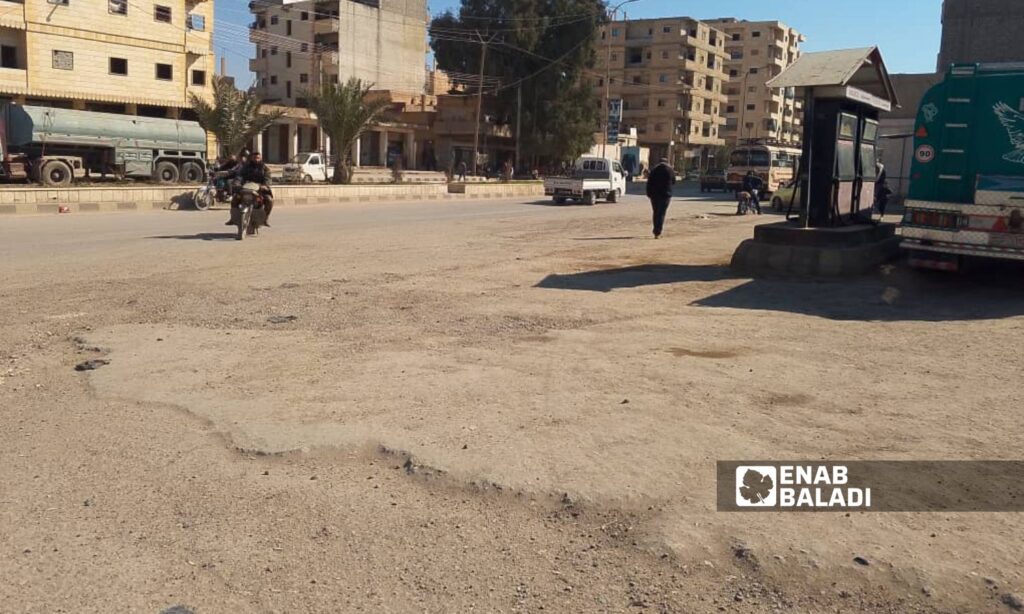For years, potholes have spread across the streets of Deir Ezzor city, causing problems for vehicle drivers and leaving residents with constant complaints that have no solutions.
The city’s streets suffer from widespread potholes, the latest of which have not been filled by the municipal council after completing the sewage works in the area since last January, with most of them accumulating rainwater.
Residents and drivers in the Dahiya and al-Joura neighborhoods in Deir Ezzor city complain about the poor state of the roads, and despite appeals they have made to the service authorities in Deir Ezzor municipality regarding the need to pave the main and secondary roads, especially after the completion of the sewage project accomplished by the municipality, their demands received no response.
Thamer, a taxi driver living in Deir Ezzor city, told Enab Baladi that the problem of poor roads is suffered by most residents of the city, as it hinders the traffic flow and forces them to take alternative routes that consume their time.
Service projects absent for years
Al-Joura neighborhood is located in Deir Ezzor city and is home to about 12,000 people from various Syrian governorates and villages. The neighborhood consists of several areas including al-Tab, Old Dahiya, New Dahiya, Villat, al-Fallujah, al-Makabes, al-Ruwad, and al-Kharsan. However, residents of this neighborhood have not seen any service projects in the area for years, some of them told Enab Baladi.
Sami al-Ahmad, a resident of al-Joura neighborhood in Deir Ezzor city, told Enab Baladi that the neighborhood he lives in quickly turns into a sea of mud after any rainfall, due to the accumulation of dust and damage to the street infrastructure for more than ten years.
He added that after the rain, he is forced to abandon his motorbike, as it cannot travel on the muddy, pot-holed streets.
In the same neighborhood, Yasmin resorts to wearing long boots to leave her home and reach the bread distributor due to the condition of the streets, expressing her surprise at the municipality’s lack of intervention to repair these streets despite the long existence of the problem.
In the same area, the municipality of Deir Ezzor allocated a number of buildings for youth housing for university students, but the absence of a sewage system and infrastructure in the area prevented their conversion into buildings suitable for habitation, according to Enab Baladi‘s correspondent in Deir Ezzor.
In addition to the aforementioned issues, al-Joura neighborhood in Deir Ezzor suffers from a lack of basic services, as it lacks a proper sewage system, making some residents rely on makeshift drains, and the neighborhood also lacks street and alleyway lighting.
Primitive alternatives
For 35 years, Rahaf has not left al-Joura neighborhood in Deir Ezzor city, and she told Enab Baladi that the problem of bad infrastructure has worsened over the past years, with no radical solutions available to the residents.
She added that she and others are forced to change their path especially during winter because of the spread of mud and potholes hidden under water puddles in the streets of the neighborhood.
Rahaf mentioned that the neighborhood residents have communicated repeatedly with Deir Ezzor municipality, but they have not received any response while the situation worsens, with increasing difficulty in moving around the neighborhood and the absence of alternatives.
Rahaf said that residents of the neighborhood resort to placing stones on the edges of the roads, so that pedestrians can jump over them and bypass water puddles and mud during winter.
Sometimes, some of the residents tend to protect their feet with plastic bags to avoid mud and water potholes, but it is not considered an effective way to avoid the poor roads, which is a problem faced by most residents of the city, not only al-Joura neighborhood, according to Rahaf.
Rainwater pooled in a pothole on one of the main roads in Deir Ezzor city – February 11, 2024 (Enab Baladi)
Municipal activity: Fines and discussion forums
Through its official Facebook page, Deir Ezzor municipality has not mentioned any service work it has completed or started to implement since the beginning of the year, and its activity was limited to discussion forums, conferences, and demolition of construction violations.
In two separate posts, the municipality published photos showing the demolition of illegal buildings in the governorate, referring to it as part of the “violation suppression” activity, in addition to dozens of posts about party meetings and others with the residents of the governorate.
The governor also conducted inspection tours of a number of establishments, according to what was published by the Deir Ezzor governorate page, but it did not announce the launch of any project in the governorate.
The Syrian regime had taken control of large parts of Deir Ezzor governorate and areas of the city center in 2017 after battles against the Islamic State organization, which had controlled the region for years. These battles resulted in damage to infrastructure in the area.
Since then, the Syrian regime’s government has not launched projects to repair the damages caused by the battles in the city, with the exception of municipal activity related to removing road obstructions, demolishing violations, and inspection tours to the drains that connect both sides of the river in the eastern part of the governorate.











